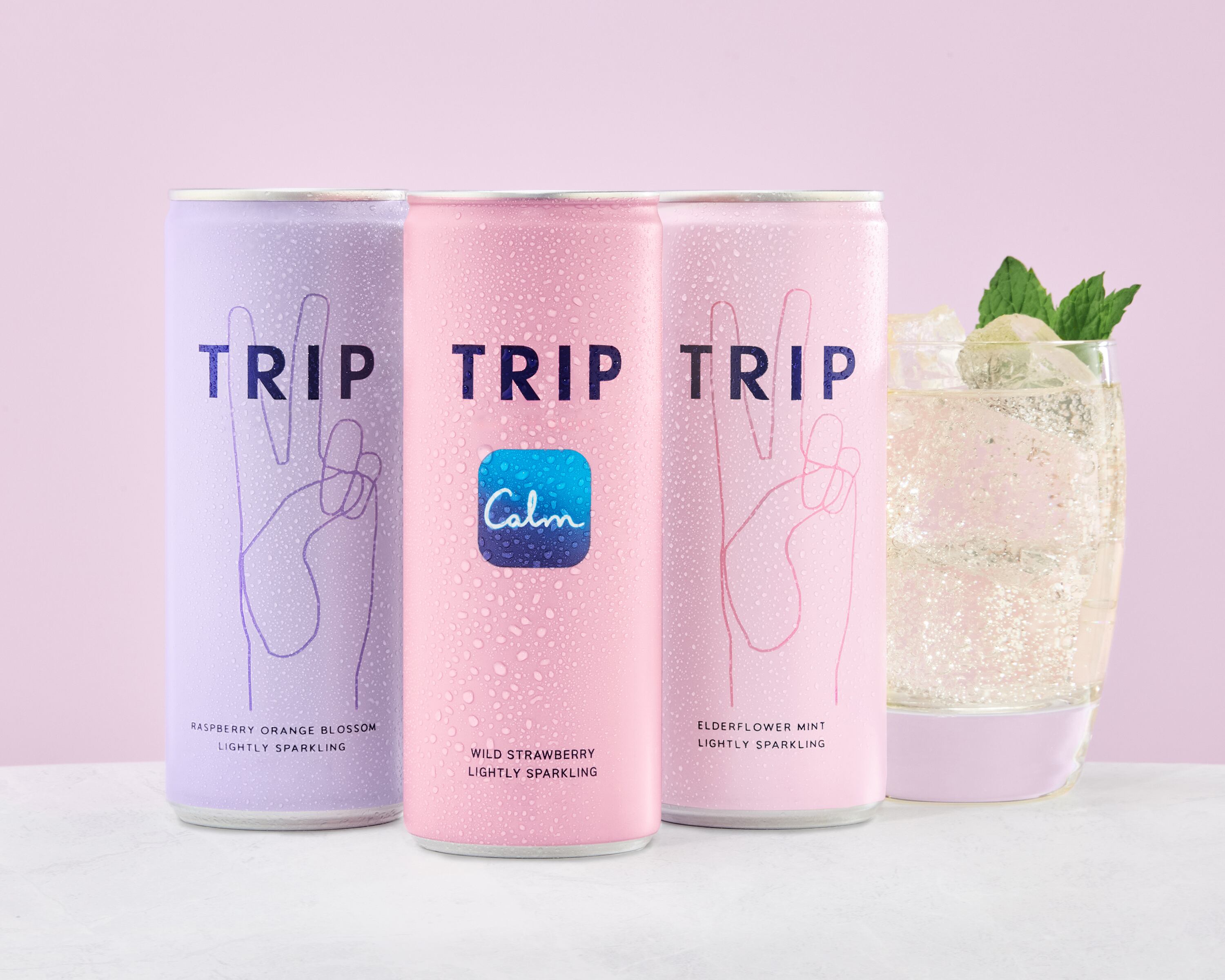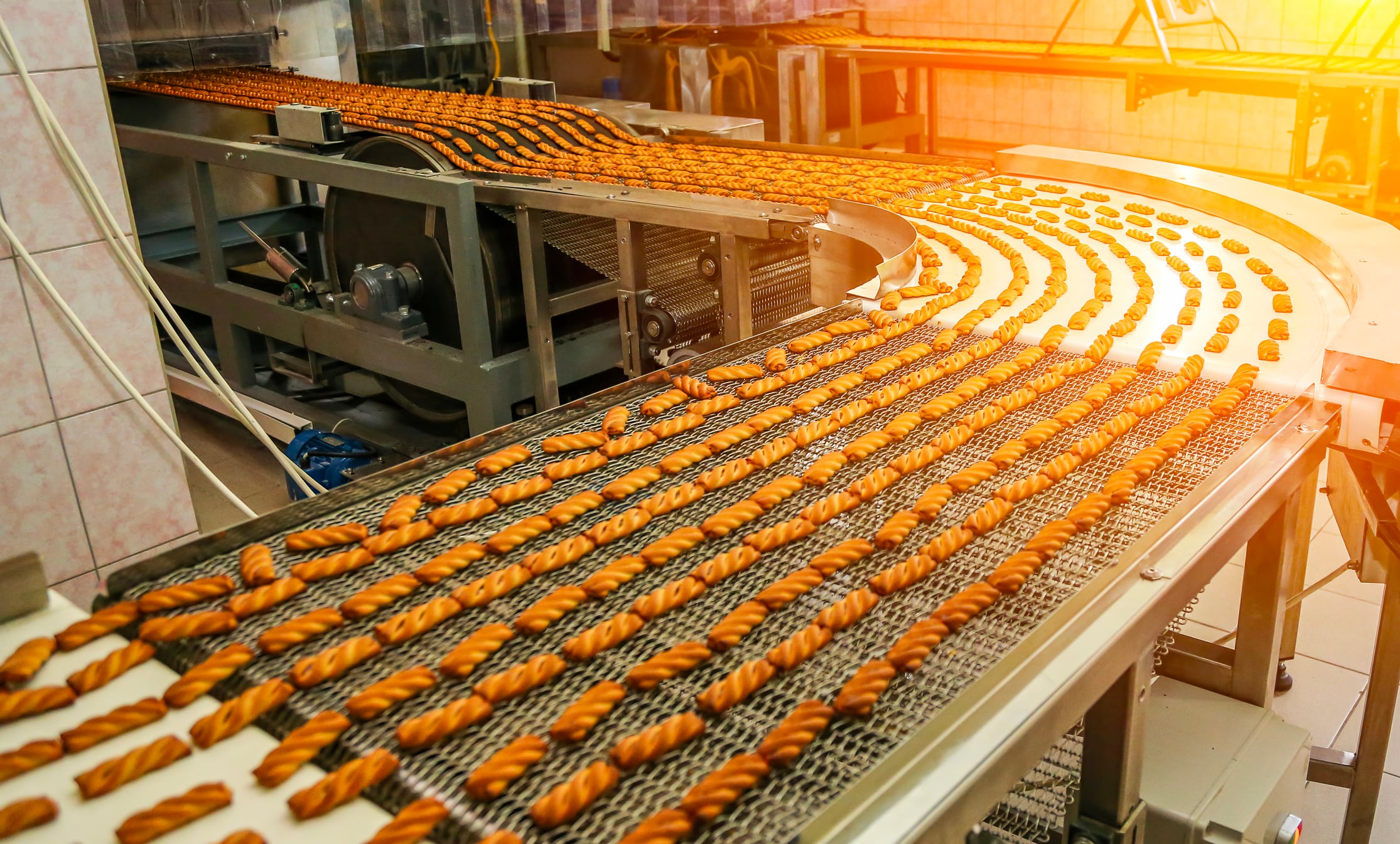1. TRIP
TRIP produces CBD-infused sparkling drinks using broad-spectrum CBD combined with low-sugar formulations and natural adaptogens, such as chamomile and ashwagandha.
It was founded by husband and wife team Daniel Khoury and Olivia Ferdi in 2019.
The brand has targeted the healthy adult drinking space, as the demand for low/no sugar and non-alcoholic beverages continues to prove popular.
“In a world where 66% of adults are actively reducing or avoiding sugar, we’re proud to be answering the call for great-tasting, better-for-you options,” a spokesperson from TRIP said.
“Over 15 million Brits took part in Dry January this year, nearly double the number from 2024 and it’s Gen Z leading the charge. In fact, 45% of Gen Z have never tried alcohol, as they are redefining what it means to socialise.”
The business success can be partially attributed to the brand’s keen eye on the world, as it continues to evolve with the consumer and expand into new categories to gain further market share, including retail, restaurant and other in-person experiences.
“Consumers also want value, which is why our collaboration with Calm, the world’s leading mental wellness app, is so meaningful,” the spokesperson added. “With the purchase of TRIP drinks or supplements, customers receive a free three-month Calm Premium membership worth £40, giving them access to guided meditations, Sleep Stories, music, and breathing exercises."
The drinks business has successfully built a community and story around its brand. In the last 12 months alone, TRIP has had a half billion impressions across Instagram and TikTok.

Earlier this year, in just five months, TRIP became the No. 1 drinks brand on TikTok Shop UK, powered by an affiliate network of over 150,000 creators and counting.
“It’s proof that our approach to brand-building in the digital age is redefining how wellness-driven brands connect with today’s audiences.”
TRIP recently launched its Wild Strawberry flavour as part of its Mindful Blend drinks range. Lightly sparkling, it’s infused with a blend of nature’s botanicals, including magnesium, lion’s mane, lemon balm and chamomile.
It has also launched its first ever magnesium and electrolyte powder: 20 single-serve sachets.
“When it comes to innovation, we always look to our community to help us shape what’s next, ensuring every new product is rooted in real wellness needs,” TRIP’s spokesperson told Food Manufacture.
The business has a clear, regulated formulation and strong consumer acceptance have helped shift CBD beverages into mainstream retail, accelerating distribution and growth.
Prakhar Agarwal, associate director at FutureBridge
2. THIS
THIS uses plant-based extrusion, proprietary texturising processes, and nutrient fortification (B12, iron) to make plant-based meat that closely simulates conventional meat in cooking and texture.
The business was founded by Andy Shovel and Pete Sharman. In 2014, Mark Cuddigan took on the role of CEO as the founders took a step aside. They both still retain a stake in the business.
Debbie Epstein, marketing director at THIS, said that data has been key in the business’s success.
“We have recently undertaken an extensive insight project to help us understand our consumers better and get closer to them,” she said. "This consumer-centric approach has meant that we are developing and delivering exactly what the consumer wants, for when they want them – we’re working to provide the best tasting plant protein products for every occasion.
“We have always been committed to developing the best plant protein products and have invested in an in-house R&D team to work on new technologies, ingredients and recipes. This has enabled us to not only meet but also anticipate the constantly changing consumer demands.

“Our recently launched Super Superfood range is a great example of how we have been able to pivot from meat alternatives to wholefoods to meet the growing demand for high protein, nutritious, clean label products.”
The range is made to be a ‘tastier’ alternative to tofu and is made from shiitake mushrooms, giving it a rich umami flavour, as well from fava beans and a whole mix of seeds. This means it deliver 30% more protein than the average tofu.
The brand has also launched its first tofu made from chickpeas.
Familiar product formats and reliable performance in recipes allow easy adoption by retailers and foodservice partners, driving fast expansion.
Prakhar Agarwal, associate director at FutureBridge
3. OCEANIUM
OCEANIUM operates a circular seaweed biorefinery that converts sustainably farmed seaweed into multiple outputs: food ingredients (e.g., OCEAN HEALTH fibres), nutraceuticals, and bio-materials such as marine-safe biopolymers.
The seaweed is sourced from regenerative seaweed farms with full traceability and transparent supply chains.
The business was founded in 2018 by Karen Scofield Seal and Dr. Charlie Bavington.
Its OCEAN ACTIVES H+ product is said to be the first marine bioactive derived from sustainably farmed seaweed.
It is clinically proven to restore microbiome balance at microdose levels – up to 95% lower than traditional prebiotics. That means powerful gut health benefits without the gas, bloating, or bulky doses.
Multi-output processing from one biomass improves efficiency and reduces waste, making the model attractive across food, nutrition, and materials markets.
Prakhar Agarwal, associate director at FutureBridge
4. Hoxton Farms
Hoxton Farms is a series A/B startup using modular, AI-enabled manufacturing to grow pork fat, a healthy and future-proof ingredient for the food industry.
It was founded in 2020 by Dr Max Jamilly and Ed Steele.
Today, the company has a team of 50 based in London with customers worldwide. It is backed by investors including Founders Fund, Fine Structure Ventures (an F-Prime Capital Fund), GlobalBrain and Mitsui Chemicals.
“Consumers don’t need another plant-based burger; they need mouth watering meat alternatives like pork belly, steak and bacon,” a spokesperson for the business told Food Manufacture back in 2023.
“They’re disappointed by the taste of today’s meat alternatives, which rely on greasy, bland, unhealthy plant oils such as sunflower or coconut. Our real pork fat is the key to unlocking the meat alternatives market – with none of the environmental or ethical impact of traditional meat.
“Our advantage lies in the combination of computational biology and mathematical modelling to design a production process that is uniquely cost-effective and scalable. We use machine learning to optimise our process and customise taste and nutritional profile. We are on track to reach cost-parity with plant oils at commercial scale.”
Since this conversation, the business has been making waves having been named a finalist for Food Manufacture’s Best Newcomer Awards and submitted a regulatory dossier for cultivated fat in Singapore.
This submission marks a major milestone for Hoxton Farms and its expansion in Asia.
The submission was overseen by chief scientific officer Dr. Vítor Espírito Santo, who previously led the world’s first regulatory approval for cultivated meat in Singapore.
“Hoxton Farms has developed a commercially viable biomanufacturing process with a derisked, asset-light path to scale,” said Dr. Max Jamilly, co-founder and CEO of Hoxton Farms. “This milestone marks the start of our regulatory journey, with many more submissions ahead as we bring cultivated fat to market across APAC and worldwide.”
Hoxton Farms plans to pursue additional regulatory submissions in the UK, North America and Asia over the coming months. The business was also selected for the Food Standards Agency’s Cell-Cultivated Products Sandbox in England and Wales in 2025.
Focus on a single high-impact ingredient (fat) addresses a core sensory gap in alternative proteins, garnering interest from manufacturers seeking better flavour and mouthfeel.
Prakhar Agarwal, associate director at FutureBridge
5. Multus
Multus develops animal-free growth media and food-grade growth factors using machine-learning-optimised formulation tools. Its products include Proliferum M and related media designed specifically for cultivated meat.
It started as a small group of engineers and scientists in 2020, who set out to help grow a sustainable bioeconomy.
The idea was to apply modern computational and biological tools to issues holding back the scale-up of biomanufacturing.
Earlier this year, the business announced the launch of its food-grade DMEM/F12 basal media – DMEM/F12-FG.
The media has been developed in collaboration with several global food and feed ingredient companies to coordinate and de-risk the supply chain, ensuring a formulation that can scale. The new food-grade product uses artificial intelligence to ensure optimal formulation and performance. It does this by identifying functionally equivalent ingredients from the food industry to replace those traditionally used in biopharmaceutical production.
“The launch of our food-grade DMEM-F12 basal media marks an important milestone in supporting cultivated meat companies as they strive towards commercialisation,” said Cai Linton, co-founder and CEO of Multus.
“With the support of global food and feed ingredient companies, we’re delivering a solution that combines the reality of an industry-standard formulation with the affordability and scalability needed for real-world production.”
Reducing the cost and complexity of growth media tackles one of the sector’s biggest bottlenecks, making Multus relevant for cultivated-meat companies trying to scale.
Prakhar Agarwal, associate director at FutureBridge
6. AllPlants
AllPlants operates a plant-based meal delivery service in the UK. The company focuses on sustainable production and distribution, with packaging that is fully recyclable, partially compostable, and reusable, aiming to reduce environmental impact.
It was founded by brothers Jonathan and Alex Petrides in 2016.
The business was snapped up by Ella & Matthew Mills, the founders of Deliciously Ella, in February 2025 after it fell into administration, and has since merged with their Plants brand.
The Mills purchased the Allplants brand name and customer database after the firm entered administration, but they did not acquire the brand’s IP, with competing firm Grubby buying the exclusive rights to the recipes and manufacturing methods for the entire Allplants product range.
7. Bioniq
Bioniq offers personalised nutritional supplements based on blood test results and health questionnaires.
A proprietary algorithm analyses a database of biochemical data to create customised supplement formulations containing precise nutrient combinations tailored to individual needs.
Vadim Fedotov, a former player for the German national basketball team, founded the business in 2019.
Earlier this year, footballer Diogo Dalot (right-back for Manchester United and the Portugal national team) joined the company as an investor, contributing over €1 million. Dalot joins fellow footballer Cristiano Ronaldo, who became a major investor in 2024, and brought Bioniq’s total valuation to $82 million.
Today, Bioniq’s products are available in 70 countries, with its total user base growing more than 10 times in 2024.
8. Win-Win
Founded in 2021 by Ahrum Pak and Dr Johnny Drain, Win-Win uses a process that mimics traditional cacao bean processing – with fermentation and roasting stages. Mark Golder, CEO, joined the business earlier this year.
However, rather than using cacao beans (which ferment via a naturally occurring microorganism), the business uses rice and koji fermentation (traditionally used to make Japanese soy sauce and miso production).
“We all love chocolate, and global consumption is continuing to increase. But conventional chocolate relies on cacao, which is suffering considerably due to climate-change. Declining yields are leading to spiralling prices, availability constraints, and deforestation, alongside the longstanding issues of child labour,” said Golder.
“Consumers are feeling the effects, with prices of chocolatey treats soaring, often alongside decreasing sizes and lower chocolate content. Win-Win provides a solution to all of this, by creating a product that tastes, looks, and behaves like conventional chocolate, but with stable and affordable pricing, reliable availability, and 80% lower carbon emissions than conventional chocolate.
“Not surprisingly, we’re seeing an explosion of interest from across the world, in all of the many different food sectors that use chocolate. Our products resonate with partners who want to innovate sustainably and affordably without compromising on taste, texture, or functionality. It’s that balance of performance and purpose that has been key to our momentum.”
In its early days, the business engaged directly with consumers while developing our B2B partnerships.

“Going direct allowed us to gather invaluable product feedback, which we continue to utilise to perfect formulations for our core customers in manufacturing. Now, our approach is to work with manufacturers and foodservice operators who are using millions of tonnes of chocolate each year,” Golder continued.
The business launched commercially this year, creating a range of chocolate alternatives based on its counterpart - this includes milk, dark and white couverture products in meltable and liquid forms, as well as its newest addition bakestable chips (made for muffins and cookies). It is also working on a powder for use in baking and drinks.
“This expansion gives our partners flexibility across multiple applications, from bars and coatings to baked goods and fillings, as well as ice-cream and desserts.”
9. Roslin Technologies
Roslin Technologies works on animal stem cell technologies to support cultivated meat production.
It has developed pluripotent stem cell lines that can self-renew indefinitely, which helps improve scalability and consistency in cellular agriculture applications.
Roslin Technologies was spun out from the Roslin Institute in 2017. The institute is part of the University of Edinburgh and the place where Dolly the Sheep - the first cloned mammal ever to be created from an adult cell - was born.
Glen Illing was the former founding CEO of Roslin Technologies. Ernst Van Orsouw joined as chief executive officer in 2021. Previously he was at Genus, the global leader in livestock genetics, where in commercial roles he was responsible for bringing to market disease resistant animals developed with gene editing.
10. Ivy Farm Technologies
Ivy Farm Technologies produces cultivated meat using technology developed at the University of Oxford.
Its process grows real animal muscle tissue in controlled environments, producing antibiotic-free meat with a lower environmental footprint compared to conventional livestock farming.
The idea came from Dr. Russ Tucker whose family hails from a butchery and farming background.
He was keen to find a more sustainable alternative to meat production and teamed up with Professor Cathy Ye from Oxford University. It was here where Ye and her team created a novel biotechnology - giving way to the birth of Ivy Farm Technologies in 2019.
Based in Oxford, Ivy Farm is actively collaborating with regulatory bodies around the world to obtain approval for its cultivated Wagyu beef, and has hired Rebecca Wright as its chief legal officer to help scale its operations, manage risk and ensure compliance within an evolving global regulatory environment.
UK start-ups by global ranking
Click here to find out the top 100 hottest start-ups worldwide.
| Company | Product category | Overall global position |
|---|---|---|
| TRIP | CBD-infused sparkling drinks and wellness products | 1 |
| THIS | Alternative meat products | 5 |
| OCEANIUM | Seaweed-based ingredients and materials | 8 |
| Hoxton Farms | Cultivated animal fat for alternative meat products | 10 |
| Multus | Animal-free, food-grade cell culture media & growth factors for cultivated meat | 15 |
| AllPlants | Frozen ready-to-eat plant-based meals | 30 |
| Bioniq | Personalized supplements and health plans | 42 |
| Win-Win | Natural flavors and plant-based ingredients | 53 |
| Roslin Technologies | Cultivated chicken and livestock proteins | 68 |
| Ivy Farm Technologies | Cultivated pork and poultry products | 75 |
| Qkine | Recombinant proteins, growth factors | 77 |
| Collectiv Food | Sustainable sourcing and last-mile delivery for foodservice | 78 |
| Different Dog | Freshly cooked, human-grade pet food | 84 |
| CleanCo | Non-alcoholic spirits and mixers | 88 |
| Dash Water | Infused sparkling water with wonky fruits | 92 |
The methodology
The data identifies the fastest-growing start-ups in F&B through a structured, data-led evaluation framework.
Start-ups were assessed across key growth and innovation parameters – including financials, funding momentum, investor quality, technology maturity, IP strength, and digital traction. This multi-dimensional assessment enabled us to pinpoint the Top 100 emerging players driving transformation across the food value chain.





